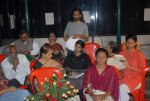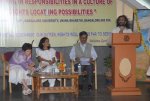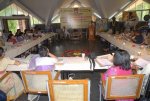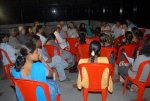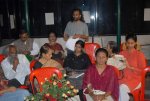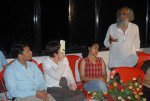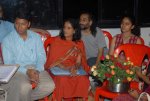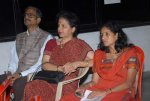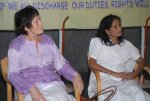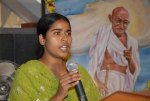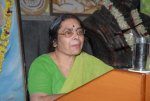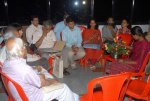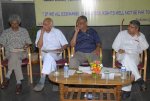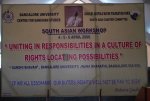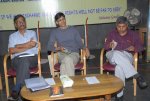
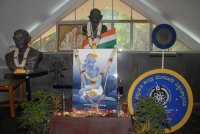
Publicado em 25 de julho de 2008
Traduções disponíveis em:
“Uniting in Responsibilities in a Culture of Rights: Locating Possibilities”
Temas largos ligados:
Human Rights .
South Asian Workshop, Bangalore, India
![]() Introduction
Introduction
![]() Workshop Proceedings
Workshop Proceedings
![]() Theme I – Philosophical Underpinnings of the Concept of Responsibility
Theme I – Philosophical Underpinnings of the Concept of Responsibility
![]() THEME II – ‘Cultural and Professional Experiences’
THEME II – ‘Cultural and Professional Experiences’
![]() Principle 1
Principle 1
![]() Principle 2 & 10
Principle 2 & 10
![]() Principle 3
Principle 3
![]() Principle 4
Principle 4
![]() Principle 5
Principle 5
![]() Principle 6
Principle 6
![]() Principle 7
Principle 7
![]() Principle 8
Principle 8
![]() Principle 9
Principle 9
![]() Concluding Remarks
Concluding Remarks
Humankind now confronts new challenges; in particular, the imperative to safeguard the environment for future generations has come into view. It is clear that the two initial agreements need a further dimension to respond to current and future challenges of survival. ’Responsibility’ is proposed as an ethical concept that builds on Rights and Peace as well as the emergence of a relational worldview that ensures the viability of planet earth and its people.
Social responsibility is an ethical theory that an entity whether it is a government, corporation, organisation or individual has a responsibility towards society. There is a large inequality in the means and roles of different entities to fulfill their claimed responsibility. Although all people have an equal entitlement to human rights, their responsibilities are proportionate to the possibilities open to them. Freedom, access to information, knowledge, wealth, and power all increase the capacity for exercising responsibilities and the duty to account for one’s actions. In this context, every one of us must take up his or her responsibilities at both the individual and the collective level. Every human being has a role to play in redefining responsibility and has responsibilities to assume. The feeling of being powerless can be lessened and even overcome by linking up with others to forge a collective strength.
In realising the responsibilities the Charter of Human Responsibilities was launched in 2001 at the World Assembly of Citizens, organized by the Charles Léopold Mayer Foundation. The idea was to encourage an international effort of renewed reflection on the relevance of individual and collective responsibility for the future of humankind and the planet, respect for Human Rights and the achievement of Peace. It was in this perspective the South Asia Workshop on the theme “Uniting in Responsibilities in a Culture of Rights – Locating Possibilities”, which was jointly organized by the Centre for Gandhian Studies, Bangalore University and the Charter of Human Responsibilities, was held on the 4th, 5th and 6th of April 2008 at the serene campus of Centre for Gandhian Studies, Bangalore. The workshop brought in 64 young and adult delegates belong to various socio professional fields from India, Nepal, Bangladesh, Sri Lanka, Iran and France for a meaningful dialogue over the theme.
The workshop began formally with an introductory session by Ms. Sudha Reddy, Coordinator for the South Asian Charter on Human Responsibilities. Ms. Edith Sizoo, Coordinator of the International Committee for the Promotion of the Charter of Human Responsibilities, Charles Leopold Mayer Foundation explained the concept of “Responsibility” and the background to the Charter of Human Responsibility. She said that the emphasis throughout the formulation of Charters and Declarations were on “rights” which focused on protecting the dignity of individuals. She quoted the example of Brazil - Children from across 20,000 schools had drafted a Childrens’ Charter of Human Responsibility and went on a long march along with their teachers to the Presidential Palace. The children read out the Charter to President, who was moved to tears. He said that throughout his tenure as President, he had received numerous delegations that were all accusatory in nature, but this was the first delegation that had acknowledged its role in the progress of the country.
Dr. Jeevan Kumar, Director of the Centre for Gandhian Studies, Bangalore University welcomed all the participants and gave a brief introduction to the workshop. He said that the Universal Declaration of Human Rights (UDHR) had taught us to fight for our rights but we had forgotten that responsibility goes along with rights. He said that the objective of the workshop was to draft an Indian Charter on Human Responsibility and to constitute a Drafting Sub-Committee to formulate the Charter. Dr. Kumar listed out 10 themes which in his opinion needed to be incorporated in the Indian Charter namely – ahimsa (non-violence), sustainability, peace, justice (economic, social and environmental), communal harmony, respect for all forms of life, civic consciousness, cleaning up politics, respect for cultural specificities and accountability.
Theme I – Philosophical Underpinnings of the Concept of Responsibility
Dr. Ananta kumar Giri, who said that is was necessary to view ‘responsibility’ in the realm of reality and possibility, chaired the session. He emphasised on the field approach to responsibility as depicted in the Bhagavad Gita – Truth, Beauty and Dialogue.
Mr. Abdul Awal from Bangladesh presented the first paper on “Active social Forces for upholding Human Responsibilities”. He began his presentation by stating that science and technological progress had not mitigated human suffering of poverty and inequality. So while UDHR guarantees civil, political, social, cultural and economic rights, it needs another dimension to resolve problems that are plaguing the world today. New strategy had to be adopted that works with children, youth, local bodies, building solidarity and formulating charters of human responsibilities at local levels.
The other speakers included Mr. Behrouz Safdari, Coordinator of the Iranian Network of The Charter of Human Responsibilities, presented different models of responsibility - Religious, Political, Teaching and Economic, Mr. E.P. Menon, Director, India Development Foundation, began with the 10th Principle of the Charter of Human Responsibilities – “To face the challenges of today and of tomorrow, uniting in action must be balanced with respect for cultural specificities.” He emphasized on the word ‘unity’ which signifies solidarity in actions. And concluded with a suggestion to foster responsibility among countries on the lines of the South Asian Association for Regional Cooperation (SAARC). The countries could enter into pacts to promote peace and harmony, an example being a “No War” pact.
Ms. Edith Sizoo’s spoke on “Responsibility: A common key-notion in a world of diversity”. She said that it was necessary to examine notions of responsibilities as understood by different cultures in order to understand their deeper meanings.
Dr. Nalin Swaris, Sri Lanka, explained that Buddhism recognized that there was an organic relationship between just social order and cosmic harmony.
Discussion
At the end of this session there was a discussion and suggestions from the participants was understood that a collective action could foster reconciliation for which dialogue was essential. Many Indian cultural practices had caused injustice to majority of the communities and rejection of the culture that infringed upon the rights of people was necessary. Examples were cited of Islamic countries where Mullahs (religious heads) occupied dominant seats of authority and said that recognition of cultural specificities would condone acts of the Mullahs. The concept of responsibility involved assuming responsibility for one’s own actions as well as enforcing them by making other players accountable for their acts which impacting other members of society. So was responsibility proportionate to the access to power and knowledge.
Dr. Ananta Kumar giri gave the concluding remarks for the session. Since the “self” is at the centre of the institutions of the State, the market and social movements, the human is the subject of responsibility in her/his capacity as a rational being and as an emotional being.
THEME II – ‘Cultural and Professional Experiences’
Dr. Makarand Paranjpe, presided the session and referred to Mr. Behrouz’s point about there being two kinds of understandings – a soft understanding and a hard understanding. And stressed that when we have incommensurable positions, it will not be possible to have dialogue. The hard positions will have to soften to enable the process of dialoguing.
The session began with Dr. Anantha’s presentation on “Human Responsibility and the Calling of Planetary Realizations: Ethics, Aesthetics and Movements of Transformations”. He spoke about the ethical approach to responsibility and said that it was important to bring responsibility in dialogue with the aesthetic. The fundamental transformation of art and imagination was crucial. Politics and art are used in struggles. It is essential to begin a process of mutual interrogation and learning where we are concerned not only with issues of application and justification but prepare ourselves to undertake suffering for peace, justice and renewing development as practices of hope.
It continued with Mr. Manjunath, veteran Gandhian, who began by saying that rights carry a corresponding duty and that responsibility should be linked to the provision of basic rights (such as eradication of poverty, hunger and untouchability). References to Buddha’s philosophy – sarvojana sukhaya, sarvojana hitaya and Gandhi’s emphasis on sarvodaya and Ambedkar’s views on social justice were related. He concluded by saying that the Charter should focus on eradication of poverty, unemployment and corruption.
The session progressed with Dr. Madhavi Singh’s presentation on “Right to be educated with the obligation to share knowledge”. She stated that education had no boundaries it flourished with values, culture and on the thrust of humanities itself. Gandhi had considered both capitalism and communism to be violent systems and advocated a non-violent society in which there was thorough decentralisation of power, production and economic resources.
Ms. Rita Roy’s paper was titled “Responsibilities in a Culture of Rights”. She said that if the term ‘responsibility’ is defined as the capacity of human beings “to respond adequately to the physical, psychological, social and spiritual requirements of life in general”, our responsibility as individuals becomes obvious. Ms. Rita referred to Gandhi’s concept of ‘sarvodaya’ (welfare of all), which awakens in each member of society a belief in herself/himself whereby s/he is able to stand up against injustice not only for herself/himself but also for others. She also referred to Gandhi’s concept of swadeshi that emphasised on self-reliance and maximum utilisation of local resources for development. Gandhi advocated decentralisation and dissolution of hierarchies whereby individuals would take responsibility for their development and the consequences of their actions.
Asha Kachru: in her presentation ‘My Responsibilities: My Pleasures’ said that it was important to understand from whose perspective we were talking about the concept of responsibilities. She stressed on the importance of bringing about fundamental change in the individual in order to bring about fundamental change in society. She said that more the freedom, access to information, knowledge, wealth and power a person has, more the capacity that the person has for exercising responsibilities and the greater her/his duty to account for her/his actions.
DAY III
“We are all responsible for making sure that Human Rights are affirmed in our ways of thinking and in our actions.”
The groups that had been formed to discuss the Principles of the Charter of Human Responsibilities made their presentations. Panel included - Mr. Engineer, Ms. Asha, Mr. Vijay and Nivedita.
The group wondered whether the principle was complete. They suggested adding on the following words, to “We are all responsible for making sure that Human Rights are affirmed in our ways of thinking and in our actions of the others, notably the State.”
• The group discussed the meaning of the term “human rights” includes economic, social, cultural, civil and political rights. The rights of children form a special category, as children are not in a position to demand or affirm rights for themselves. • There was a lot of deliberation on whether the term “human rights” referred too individual rights or group rights but there was no consensus. • The group examined the Preamble and found it inadequate, as it does not take into account the interdependence of people, as the existing structures of power were asymmetrical. • The group found that it could not discuss one principle without thinking of all the others together.
Discussion
At the end of this session the reflections cited were
![]() That cultural nuances had to be examined as world over people were adding cultural material pertaining to their region.
That cultural nuances had to be examined as world over people were adding cultural material pertaining to their region.
![]() “Human responsibilities” instead of “human rights” was more appropriate in principle as human rights were guaranteed in the UDHR.
“Human responsibilities” instead of “human rights” was more appropriate in principle as human rights were guaranteed in the UDHR.
![]() It was important to keep the language of the Charter simple and one of the compulsions was not to have a long document as nobody had the patience to read reams and reams of paper.
It was important to keep the language of the Charter simple and one of the compulsions was not to have a long document as nobody had the patience to read reams and reams of paper.
![]() The members of the group agreed that the discussions were part of a process that would take time, but that all the participants would work on the Charter and continuously keep developing it.
The members of the group agreed that the discussions were part of a process that would take time, but that all the participants would work on the Charter and continuously keep developing it.
Principles 2 and 10 “Every person’s dignity involves contributing to the freedom and dignity of others.”
“To face the challenges of today and of tomorrow, uniting in action must be balanced with respect for cultural specificities.”
The group members were Dr. Anantagiri, Ms. Farmida, Dr. Singh, Ms. Tanushree and Ms. Padma.
• The group said that “dignity” was integral to life and was inherent in everybody. It could not be given by any external agency nor can it be taken away. There is a limitation in the connotation of the word ‘dignity’. • The discourse on ‘dignity’ in English could be enriched through the exploration of the meanings of the word in human life. • While discussing unity and cultural specificities, the group again discussed the term ‘unity’ in different languages. • The word ‘uniting’ advocated the process of holding hands. However, the word ‘unity’ should not mean becoming one, but should mean the peaceful co-existence of different cultures together.
Discussion
Reflections cited were
![]() At this stage it was very important to revive our indigenous traditions.
At this stage it was very important to revive our indigenous traditions.
![]() Actions cannot be conferred from the outside but has to be awakened within and initiatives taken have to safeguard the dignity of millions of people who have been backward and suppressed.
Actions cannot be conferred from the outside but has to be awakened within and initiatives taken have to safeguard the dignity of millions of people who have been backward and suppressed.
![]() The usage of the word adhikar that is used in Hindi and Bengali had far greater impact than its English meaning “right”. Also mentioned that Narendra Modi’s Gujarat involved a total lack of dignity of many people who were minorities in the region.
The usage of the word adhikar that is used in Hindi and Bengali had far greater impact than its English meaning “right”. Also mentioned that Narendra Modi’s Gujarat involved a total lack of dignity of many people who were minorities in the region.
Principle 3 - No group or discussion
“Responsibilities include ensuring the fulfilment of human potential, inclusive of material needs and non-material aspirations, as well as obligations to support the common good.”
“Lasting peace can only be expected from freedom, justice, and processes for reconciliation which are respectful of human dignity and human rights.”
The group was represented by people from four countries Mr. Awal from Bangadesh, Mr. Swaris from Sri Lanka, Dr. Madhavi Singh from Nepal and Ms. Tara Bhat, Ms. Sharada Bhat and Ms. Rita Roy from India. The discussion had valuable insights from four countries, particularly from Nepal and Sri Lanka where there have been severe conflict situations.
• From the experiences in the different countries, the group came to the conclusion that conflicts arose out of different kinds of injustices – economic, social, gender, climate etc. and also from hunger for power and position. The group also said that too much emphasis on rights ignoring duties and responsibilities created situations of crisis and conflict. • The group asked a very pertinent question – for whom is the Charter meant? The answer is that it is accessible only by the literate. It is necessary to be able to effectively communicate the contents of the Charter to the non-literate in order to include their perceptions instead of imposing the views of literate people on them. • In order to tackle endemic violence in society, it is necessary to work for peace from a basic and fundamental level by removing inequalities. Peace should take place on an everyday basis and not merely during meetings. Protests against violence and injustice should be regular. • It is important to spread peace education not just by talking about wars and treaties but more importantly to inculcate the rights values. • One of the root causes of terrorism is economic injustice and violations of human dignity. It is imperative to respect and accept each other.
Reflections of the session included:
![]() The Jains, Hindus and Buddhists have a tradition of advocating ahimsa. The roots of violence go into the psyche itself – its own cravings and attachments. When people are in conflicts with themselves, this results in outward conflicts.
The Jains, Hindus and Buddhists have a tradition of advocating ahimsa. The roots of violence go into the psyche itself – its own cravings and attachments. When people are in conflicts with themselves, this results in outward conflicts.
![]() The question of ‘how the concept of responsibility could be made understandable to fundamentalists and terrorists.’ Reconciliation should be an ongoing process as it was crucial.
The question of ‘how the concept of responsibility could be made understandable to fundamentalists and terrorists.’ Reconciliation should be an ongoing process as it was crucial.
![]() Technology was an immense threat to peace. Gandhi’s Hind Swaraj, which spoke about the nature of technology and the violence, that came with it. Also referred to Eistein’s Last Days where Einstein wondered whether his technology was leading to disastrous consequences.
Technology was an immense threat to peace. Gandhi’s Hind Swaraj, which spoke about the nature of technology and the violence, that came with it. Also referred to Eistein’s Last Days where Einstein wondered whether his technology was leading to disastrous consequences.
![]() Ahimsa is not confined only to the realm of social relations but is also applicable to modes of thinking. A profound mode of thinking in the modern Western world is dualism, which is a profound epistemological contribution to the practice of non- peace in various walks of life.
Ahimsa is not confined only to the realm of social relations but is also applicable to modes of thinking. A profound mode of thinking in the modern Western world is dualism, which is a profound epistemological contribution to the practice of non- peace in various walks of life.
![]() Peace is invoked not just on human beings, animals and other living beings but also on vanaspati, vishvedeva, antarikshaka shanty etc., essentially indicating that peace should go beyond our planet.
Peace is invoked not just on human beings, animals and other living beings but also on vanaspati, vishvedeva, antarikshaka shanty etc., essentially indicating that peace should go beyond our planet.
“Development and consumption of natural resources to meet human needs, and the quest for prosperity must be backed by a commitment to sustainability and the principle of precaution, assuring proactive protection of the environment, careful management of its diversity, and equitable sharing of wealth.”
Group included - Mr. Bhavanishankar, Dr. Bawa and Dr. Jeevan Kumar.
• The group said that there was an urgent need to relook at the globalisation model of development, which was dominating the country as well as the world. This model of development has resulted in the melting of the snow on the Himalayas, coastal erosion, drying up of rivers etc. • The globalisation model of development placed undue emphasis on the high rate of growth even though it leads to further deterioration of the poor and weaker sections of society. • The group discussed sustainable processes of development that had been introduced towards the end of the British rule such as biomass production, village development and natural agriculture. There is room for a various kinds of irrigation dams (whether big, small or medium). The objections to construction of dams raised by Medha Patkar and Sunderlal Bahuguna are to be considered seriously by representatives of civil society, government officials and engineers. • The food crisis after Independence led to an emphasis on Artificial Fertilizers. Today’s food crisis has led to the demand for a Second Green Revolution on the one hand, and import of food grains on the other. The group said that in case of a second Green Revolution, it should be based on natural agriculture, water saving and sustainable growth based on the Gandhi-Kumarappa-Schumacher model. • Preservation of biodiversity requires importance being placed on human rights, animal rights and the rights of the Earth. • Equitable sharing of wealth can be achieved not by the mass creation of wealth through four-lane highways, world class airports, shopping malls and flyovers but through the adoption of a policy whereby distribution of wealth is built into the system of production.
Discussion
![]() “Quest for prosperity” - what the stance was for using this and said that we should advocate the use of restrictions on the unending quest for prosperity that was resulting in unsustainable and unequal development.
“Quest for prosperity” - what the stance was for using this and said that we should advocate the use of restrictions on the unending quest for prosperity that was resulting in unsustainable and unequal development.
![]() Gandhi Sagar dam that had been constructed by the Labour Department under the able guidance of a Gandhian was a success, as relief and rehabilitation was adequately done. Unfortunately, the Gandhi Sagar model has not been replicated anywhere in India.
Gandhi Sagar dam that had been constructed by the Labour Department under the able guidance of a Gandhian was a success, as relief and rehabilitation was adequately done. Unfortunately, the Gandhi Sagar model has not been replicated anywhere in India.
![]() Feminist dimension to the discussion was needed, as the dominant model of development was a male one which did not take women’s needs into account.
Feminist dimension to the discussion was needed, as the dominant model of development was a male one which did not take women’s needs into account.
![]() Farmers were not ignorant of the model of development and were migrating from Vidarbha to Nagpur in search of a better livelihood.
Farmers were not ignorant of the model of development and were migrating from Vidarbha to Nagpur in search of a better livelihood.
![]() The issue of domination within specific geographic regions, an example being India’s domination over smaller South Asian countries.
The issue of domination within specific geographic regions, an example being India’s domination over smaller South Asian countries.
"The full potential of knowledge and know-how is achieved through valuing different knowledge systems and ways of knowing, sharing them, and applying them in the service of unifying solidarity and a pluralistic culture of peace.”
Discussion
![]() There was a clash of different knowledge systems (holistic systems versus the systems post Enlightenment) as a result of which traditional knowledge had suffered a setback. Traditional knowledge systems have methods of self-production without the use of machinery.
There was a clash of different knowledge systems (holistic systems versus the systems post Enlightenment) as a result of which traditional knowledge had suffered a setback. Traditional knowledge systems have methods of self-production without the use of machinery.
![]() It was highlighted that traditional knowledge systems could continue if they were valued and if there was demand for it.
It was highlighted that traditional knowledge systems could continue if they were valued and if there was demand for it.
![]() Issue of geographical indicators and licences (like patents and copyrights) and so on, are not mentioned in the Charter. IPR and patenting have to be mentioned in the Charter.
Issue of geographical indicators and licences (like patents and copyrights) and so on, are not mentioned in the Charter. IPR and patenting have to be mentioned in the Charter.
![]() Modern forms of medicine had become a form of exploitation of our traditional health medicines and it is important to patronise traditional systems like ayurveda.
Modern forms of medicine had become a form of exploitation of our traditional health medicines and it is important to patronise traditional systems like ayurveda.
“Freedom of scientific research implies being guided by ethical criteria such as enhancement of biodiversity, respect for human dignity and non-human forms of life, and regard for the limitations of human knowledge.”
The group comprised of Mr. Menon, Mr. Behrouz and Ms. Sudha.
The group discussed the question as to whether scientists should be given absolute freedom. Can scientists be controlled? There was no consensus on the question within the group. Mr. Menon said that no restrictions could be placed on scientific research, freedom to carry out research should be uncontrolled and unconditional. But restrictions had to be placed at the stage of application, considering relevant factors like bio-diversity, human dignity, respect for non-human life forms etc.
During discussion, while some shared the opinion a few deferred as they felt that science though a boon to humanity was also a bane and it would negated the entire Charter if freedom was provided to scientists. View was that there was no need for a “scientific research” in the Charter at all as doing so would give undue importance to science and assign it false superiority.
Mr. Menon defended his stance on the principle saying that the freedom of scientists to ascertain the truth could not be curtailed and that restrictions could be placed only on the application of their research.
“The exercise of power is legitimate where it serves the common good, and if it is accountable to those over whom it is exercised.”
The group members were Ms. Melanie Kumar, Mr. Nitin and Ms. Nimisha Kumar.
• After much deliberation about various units in a society (household, community, nation etc), it decided that power was vested in the State. The “state” would not only include all government bodies but would also include international institutions such as the United Nations. • The next aspect that was deliberated by the group was the meaning of the term “common good”. One question that arose during the discussion was whether common good included freely available resources (commons) such as water and air. The group felt that common resources were not included within the ambit of the principle. • The other question pertaining to “common goods” was whether all common goods were to be made available to all persons in the same proportion. Mr. Nitin made a distinction between common minimum goods and common special goods. He said that ‘common minimum goods’ would have to be available to all people irrespective of their identities whereas ‘common special goods’ would be provided to special groups. • There was consensus on the last aspect of the Principle on the issue of accountability. All institutions of the “state” would be accountable for actions resulting from the power exercised by them.
Discussion
In continuation with the session the group shared that power had to have a ‘Shakti’ outlook. Shakti meaning sacred force, power or energy is the Hindu concept or personification of the divine feminine aspect. Meaning of power is related to representative power and ruling power. The power must be for the purpose of common good that should reflect the will of the people. And an important point about Gandhi’s opinion about power was raised - Gandhi did not want concentration of power with the State and advocated decentralisation.
“In reaching decisions about short-term priorities, evaluation of long-term consequences must concur with ethical priorities of justice and inter-generational environmental stewardship, taking into account both risks and uncertainties.”
The group members were Mr. Dinesh, Mr. Paranjpe, Ms. Edith, Ms. Ganga, Mr. Chaitanyaprasad.
• What is human praxis? Human beings find themselves in circumstances created by other human beings. Human beings can therefore change this. This is related to human sensitivities. • In explaining social differences, society appears to have adopted “injustice by an invisible hand”. Therefore, karma has taken on a negative connotation. The word "karma" has taken on the meaning of “pre-determination, a predestined birth status” (consequence of deeds in our previous births which we have no control over) instead of its more general meaning: “long-term consequences” of our deeds. • However, the theory of karma is tool to understand causality. We should look at karma and reincarnation in a non-violent way (ahimsa) where we do not violate our own deeds. Karma should define our priorities in a way that makes us caring and sensitive to human beings, animals and other living beings. • The relevant question then would become: What is the present of my past, and what is my presence in the future? • If this (karma, ahimsa, re-incarnation, human sensitivity to nature) defines a grammar, then what is the language of discourse? • Would Principle 9 in this language be something like:
“The woof, the moo
and all the things that
you moved
when the music played for you
This dance (this engagement)
is to become one
with you, my love
_ my nature, my elements”
Concluding Remarks – Dr. Jeevan Kumar
Dr. Kumar began by reiterating that the human rights discourse was instrumental to rethink about human responsibilities. We have to rethink and look at when the discourse of human rights began, and would find that the State is the guarantor and protector of rights. And if the State is depriving us of our rights, we have to assert ourselves and remind the State of its duty to protect our rights. Similarly for a discourse on human responsibilities the State has a major role to play. He felt that we needed to have a detailed discussion on how the State should be made more responsible. Dr. Kumar said that the central part of his argument pertained to development. The State had decided which model of development to be followed. The globalization policies were also decided by the State. The State centric approach raised questions of policy making, power politics, creation of hierarchies, exploitation, expropriation and appropriation and creation of dependency. Dr. Kumar said that we might have lost sight of the fact that it was the all-pervading State, which has the power but is not accountable, and has created many problems for us which has warranted us to come together to talk about human responsibilities. He said that if we were able to get the State and its agencies to be more accountable, much of what we are doing would not get lost.
Dr. Kumar reiterated the need to interrogate the model of development that was currently being followed. He said that we have to be more reformative and place importance to such exercises. At this juncture, when we are looking for solutions, Gandhi comes as a breath of fresh air.
Ms. Sudha -
Sudha said each principle is very complex and has several meanings. It is important to translate and simplify the principles into different languages while reaching out to the diverse groups and individuals. She informed the participants that Charter of Human Responsibilities has already been translated into several Indian languages and foreign languages as well. Shared her initial experience of introducing the Charter in simple multi lingual among the marginalized and illiterate women in bringing a true sense of democratic leadership, solidarity and reciprocity in the process of self-empowerment of these women. The response from these women to the true meaning of Responsibility is an ability to respond fearlessly and truly to the challenges. There is no freedom without responsibility. The more freedom we enjoy, the greater the responsibility we have towards others and ourselves. Freedom and responsibility are interdependent. In fact assuming responsibility is the means to empowerment. Empowerment should not mean power over others, power to control more than our share, power to nurture, heal, care for others including nature, power to fight for justice, dignity, and power to achieve inner transformation leading to wisdom and compassion.
She also said that in the past, dialogue with diverse groups of youth, it was pointed out that instead of using the term “human rights”, we should use the phrase, “rights of all beings”.
She concluded by saying that we need a paradigm shift in building the formal knowledge of man and innate wisdom of woman for harmonious relationship between humans and between humans and the mother earth. The principles of Charter empower us to balance the notions of freedom, responsibility and power. We hope that The Charter of Human Responsibilities will be a companion as we move on and become a movement that would exhort people to act responsibly towards life on the planet. She requested all the participants to take forward the Charter through their respective professions.
Vote of Thanks
Dr. Kumar said that he was not sure about the way forward but was open to suggestions to take the dialogue ahead.
Way Forward
Ms. Asha Kachru concluded by making an observation on the gender aspects of responsibility; on what the women of Asia can do. The capacities of Asian women can be utilized in a more effective way both for their own betterment as well as for the alleviation of society. She highlighted four points:
1. We need to build networks of men and women to recognize gender equity.
2. International treaties should include affirmative action for girls and women.
3. There should be gender sensitization at the policy making level.
4. Counseling facilities should be made available for women and men within families.
The participants reflected that responsibility had gained acceptance as both a principle and a practice. Such discussions should be used as a tool to take the concept of human responsibilities, which implies universal application, forward. It was important to hold such discussions with marginalized groups at the community level, wherein they are also engaged to disseminate the concept of human responsibilities. The Principles could be rephrased and circulated among organizations and educational institutions. The participants concluded that emphasis should be laid on the self-practice and promoting the Charter of Human Responsibilities in different forms specific to their regions through various forms of communications and collective actions to be taken on several issues within the frame work of the Charter.

